Berries Help to Unclog Your Brain
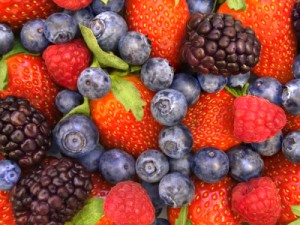 New research shows that blueberries, strawberries and acai berries can promote brain health. They appear to work by restoring overactive microglia cells that are responsible for removing biochemicals that would otherwise interfere with brain function.
New research shows that blueberries, strawberries and acai berries can promote brain health. They appear to work by restoring overactive microglia cells that are responsible for removing biochemicals that would otherwise interfere with brain function.
The researchers suggest eating whole fruits to get the maximum effect. Interested to hear from readers that eat berries for brain health. What berries do you eat and why?
Categories: Cognitive Decline, Diet, Memory and Learning Tags: fruit
Slow But Steady to Win Brain Health Race?
 Making small changes to our daily activities can make a big difference over the years. Often called lifestyle tuning, this approach can be applied to build brain health and improve your cognitive performance. We have covered many tunning techniques on the Next Brain Blog.
Making small changes to our daily activities can make a big difference over the years. Often called lifestyle tuning, this approach can be applied to build brain health and improve your cognitive performance. We have covered many tunning techniques on the Next Brain Blog.
Posit Science, a leader in brain training software, offers 14 Brain Training Tips. They range in change magnitude from walking on rough surfaces to eating fish and learning to play a musical instrument. Here are the ones that are easy-to-do lifestyle tuneups:
4. Exercise Your Peripheral Vision
13. Walk on a Cobblestone Path
Although we don’t have research that proves lifestyle tuneups produce lasting improvements in brain health and cognitive performance, we do have such research for cardiovascular health. For example, taking stairs instead of an escalator or a 10 minute walk does in fact improve heart health. My bet is that analogous lifestyle tuneups for the brain will improve cognitive performance.
Interested to hear about your techniques for taking a slow but steady approach to the changes needed to improve brain function and cognitive performance
Categories: Diet, Lifestyle, Mental Focus, Perception Tags: brain training, cognitive fitness, exercise
Phosphatidylserine Improves Thinking in 10 Days
 Phosphatidylserine is a supplement that some claim can stave off cognitive decline in the elderly and boost memory, learning, mood and decision-making in people of all ages. I have seen conflicting studies so I am always on the look out for new ones that are done with great scientific rigor and that might help settle the issue.
Phosphatidylserine is a supplement that some claim can stave off cognitive decline in the elderly and boost memory, learning, mood and decision-making in people of all ages. I have seen conflicting studies so I am always on the look out for new ones that are done with great scientific rigor and that might help settle the issue.
Found one recently that was presented at the 7th Annual International Society of Sports Nutrition Conference. It was a small study but it was double blinded and placebo controlled. You can read about it in, Study Shows PS Use Improves Cognition Prior To Exercise.
Here is the key finding:
“Cognitive performance was measured by the serial subtraction test (SST), a validated method in which subjects repeatedly subtract from 1,579 by intervals of seven. PS supplementation did reduce the time needed for a correct calculation by 21%, reduced the total amount of errors by 38% and increased the amount of correct calculations per error by 42% prior to exercise.”
To achieve this effect athletes took 400 mg a day for 10 days. I don’t think “safe and effective” dose guidelines have been established I have seen other studies and recommendations that use between 300-500mg daily.
I am not advocating the use of this supplement. I am however, interested in hearing from readers that use it. What dose, how long and what kind of benefits or side effects are you experiencing?
Categories: Cognitive Decline, Decision Making, Diet, Manage Emotions, Memory and Learning Tags: smart drugs
Brain Healthy Recipe of the Week Program
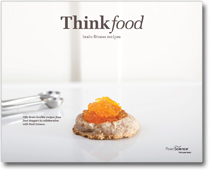 Posit Science, a brain training firm, recently announced a brain healthy cookbook and recipe of the week program called ThinkFood. You can signup here.
Posit Science, a brain training firm, recently announced a brain healthy cookbook and recipe of the week program called ThinkFood. You can signup here.
The first recipe is for Banana Oatmeal Chocolate Chip Cookies. You get a list of ingredients, preparation instructions, an explanation of why it is brain healthy and an introduction to the food blogger that authored it.
Just in case you are wondering, the Banana Oatmeal Chocolate Chip cookies are brain healthy because “They benefit from a combination of brain foods: chocolate, banana, flax, and walnuts. The more brain-healthy ingredients, the better!”
There are 50 recipes to try. Interested to hear from readers than sign up and put some of these recipes to the test.
Categories: Diet Tags:
Best Evidence for Improving Brain Health
 The Alzheimer’s Association working in conjunction with the National Institute for Health has a established a website to keep citizens up to date on what the latest scientific evidence has to say by brain health. The site Maintain Your Brain, recommends eating a brain-healthy diet and staying physically, mentally and social active. Techniques we have covered elsewhere in the Next Brain Blog.
The Alzheimer’s Association working in conjunction with the National Institute for Health has a established a website to keep citizens up to date on what the latest scientific evidence has to say by brain health. The site Maintain Your Brain, recommends eating a brain-healthy diet and staying physically, mentally and social active. Techniques we have covered elsewhere in the Next Brain Blog.
Of special interest is the 70-page National Public Roadmap for Maintaining Cognitive Health (this a 2.5 MB file) and the Interactive Tour of the Brain. The tour is quick and easy but informative. It provides basic knowledge of the brain and Alzheimer’s disease.
A few minutes on the site provides strong motivation for considering the long-term health of your brain and what needs to be done today. To quote the site:
“When people think about staying fit, they generally think from the neck down. But the health of your brain plays a critical role in almost everything you do: thinking, feeling, remembering, working, and playing – even sleeping.”
Interested to hear from readers on what specific things they are doing to maintain brain health.
Categories: Cognitive Decline, Diet, Lifestyle Tags:
Fish Oil Fails to Boost Cognition in Older Adults
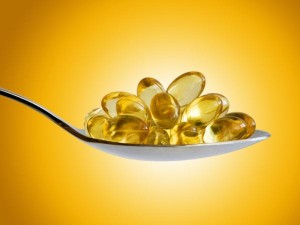 Another major scientific study on a technique for improving brain function and cognitive performance has delivered a negative result. The study looked at the cognitive impact of taking Omega 3 fatty acid or fish oil over a two year period on 70-80 year olds. The study found:
Another major scientific study on a technique for improving brain function and cognitive performance has delivered a negative result. The study looked at the cognitive impact of taking Omega 3 fatty acid or fish oil over a two year period on 70-80 year olds. The study found:
No cognitive improvements as compare to a placebo.
The author of the study cautions drawing strong conclusions as it may take more than two years to see an effect or it might be essential to start earlier in life. To quote:
“From the data we have collected in the OPAL study there is no evidence of an important benefit for memory or concentration of increased omega-3 fatty acid consumption over a two year period among older people with good cognitive health. However, it is important to keep in mind that poor cognitive function can take many years to develop and although this is the longest trial of its kind ever conducted, it may be that it was not long enough for any true beneficial effects to be detected among this healthy cohort of older people”.
OPAL stands for Older People And omega-3 Long-chain polyunsaturated fatty acids. The OPAL study seeks to discover simple dietary supplements that will help maintain cognitive and retinal function later in life. We will continue to track their work and report results on the Next Brain Blog.
Categories: Cognitive Decline, Diet, Memory and Learning, Older Adult Tags:
Which Fish are Best For Your Brain?
 A reader asked, is fish really good for brain function and if so which fish is best? Some fish contain Omega 3 fatty acids which have been shown to improve memory function, increase serotonin (elevate mood) and support longer-lasting cells and more efficient messaging.
A reader asked, is fish really good for brain function and if so which fish is best? Some fish contain Omega 3 fatty acids which have been shown to improve memory function, increase serotonin (elevate mood) and support longer-lasting cells and more efficient messaging.
Mindpower Magazine has an interesting post claiming that Tilapa (a popular fish) has little brain benefit as it contains Omega 6 rather than Omega 3 fatty acids. Here is their list of the best brain fish:
- Salmon (wild salmon is preferred to the farmed variety)
- Mackerel
- Trout
- Whitefish
- Bluefin Tuna
- Sardines
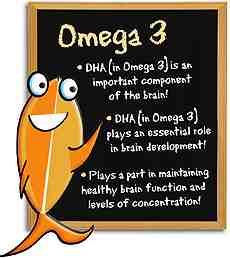 Jean Carper, author of Your Miracle Brain (discussed in another post) offers this list of Ten Fish with the Most Smart Fats:
Jean Carper, author of Your Miracle Brain (discussed in another post) offers this list of Ten Fish with the Most Smart Fats:
- Anchovy
- Bluefish
- Herring
- Mackerel
- Sablefish
- Salmon
- Sardines
- Lake Trout
- Tuna, bluefin
- Whitefish
There is considerable overlap in the two lists. Interested to hear from reader about their favorite brain fish or about which fish to avoid and why.
Sources:
Image of Fresh Fish Market and image of Omega-3 Poster
Categories: Cognitive Decline, Diet, Manage Emotions, Memory and Learning Tags:
Coffee: The Preferred Drink of High Performing Long-Lasting Brains
 In the Next Brain Blog we explore specific ideas and tools for improving cognitive performance and brain function. Low lying fruit or approaches that are simple, scientifically proven and easy to enact are of special interest.
In the Next Brain Blog we explore specific ideas and tools for improving cognitive performance and brain function. Low lying fruit or approaches that are simple, scientifically proven and easy to enact are of special interest.
Consider for example the simple act of drinking coffee or a relate caffeinated beverage. The scientific evidence for the brain-enhancing effects of coffee are really stacking up. A recent post on Psychology Today’s New Brain Blog, The Fountain of Youth in A Cup of Coffee – Ladies Only, reports:
“Coffee lovers appreciate the mood kick and mental boost a delicious cup of java provides. The enhanced learning, memory, and speed of information processing caffeine delivers has been well documented scientifically. New research published on-line in the current issue of the Journal of Alzheimer’s Disease, reports that coffee can also ward off some effects of aging on the brain. Previous research has shown that caffeine lessens the damage of Alzheimer’s disease caused by the toxic peptide that forms the senile plaques in brains of Alzheimer’s patients. This new study examined 641 elderly persons (over the age of 65) living in three cities in France, Bordeaux, Dijon, and Montpellier. Researchers found a relation between coffee consumption and prevention of cognitive deterioration including the loss of brain tissue in the elderly.”
The post goes on to discuss a recent brain scanning study that shows women (but not men) that drink 3-cups (but not less) of coffee per day lose less white matter after age 50. Thus the subtitle on the post – for women only. But the other studies and effects appear gender neutral.
Boosting energy, mood, memory, learning, processing speed as well as blocking aspects of cognitive decline… all from drinking coffee!
Coffee can have other effects as well. Any changes in diet, physical activity or lifestyle should be considered carefully.
Source: Image of Coffee Man
Categories: Cognitive Decline, Diet, Manage Emotions, Memory and Learning, Mental Focus Tags: mental energy
DASH Diet + Aerobic Exercise = 30% Improvement in Brain Function
 According to a news release by the American Heart Association, a diet developed to improve blood pressure combined with aerobic exercise over a four month period appears to improve the mental functioning of older overweight adults. Researchers claim mental functioning improved by 30%. Quoting the news release:
According to a news release by the American Heart Association, a diet developed to improve blood pressure combined with aerobic exercise over a four month period appears to improve the mental functioning of older overweight adults. Researchers claim mental functioning improved by 30%. Quoting the news release:
“Researchers assessed mental functioning with a battery of neuropsychological tests, including Executive Function-Memory-Learning and Psychomotor Speed. These tests measure cognitive skills involving manipulation of ideas and concepts and planning ahead. The tests were given before and after the four-month treatment program.”
The diet plan is called DASH (dietary approaches to stop hypertension) and involves:
- Eating more fruits, vegetables, whole grains, fish, poultry, nuts and foods rich in magnesium, potassium, and calcium
- Cutting back on red meats high total-fat foods and sweets
If you want to give it a try there are specific guidelines, recommendations and even food plans on The Dash Diet Plan Eating site.
The aerobic exercises were basic but supervised and took place for 30 minutes three times per week.
It is important to note that you have to do both the diet and exercise to get the improvement in mental functioning. Control groups that did one or the other, or nothing showed no improvement in mental functioning. These type of combination effects (doing two or more interventions to get a boost in cognitive performance) are common and will be frequently covered on the Next Brain Blog.
Source: Exercise and Diet Image
Categories: Cognitive Decline, Diet, Executive Function, Lifestyle, Memory and Learning, Older Adult, Other, Problem Solving Tags: exercise, fruit
Vitamins for Cognitive Performance
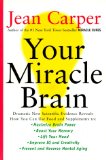 I am often asked if there are specific vitamins that are proven to enhance brain and cognitive function. The answer is yes but the level of improvement is not always clear. Vitamins that are generally called out for their brain boosting effects include:
I am often asked if there are specific vitamins that are proven to enhance brain and cognitive function. The answer is yes but the level of improvement is not always clear. Vitamins that are generally called out for their brain boosting effects include:
- B vitamins – memory and brain development
- Antioxidants or vitamins E, C and A (beta carotene) – overall functioning
- Multivitamins – overall functioning
Of course it is not just vitamins that help our brain function well but other supplements (e.g. minerals and fatty acids) and the foods we eat. Diet and supplements will be a frequent topic on the Next Brain Blog.
For a comprehensive overview of how supplements and diet impact brain function I suggest you read (or listen to) Jean Carper’s book, Your Miracle Brain: Dramatic New Scientific Evidence Reveals How You Can Use Food and Supplements To: Maximize Brain Power, Boost Your Memory, Lift Your Mood, Improve IQ and Creativity, Prevent and Reverse Mental Aging.
If you take supplements or have customized your diet to improve cognitive performance please leave a comment and share your results.
Categories: Books, Cognitive Decline, Diet, IQ and EQ, Memory and Learning, Mental Focus Tags: vitamins

